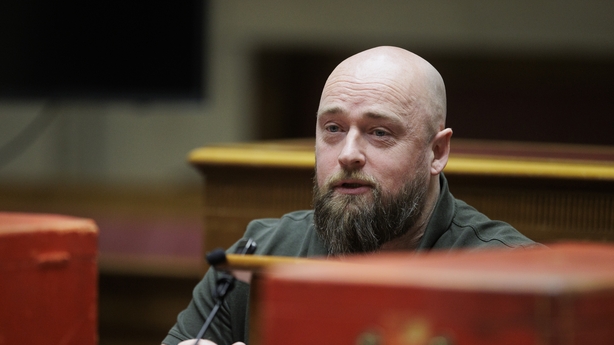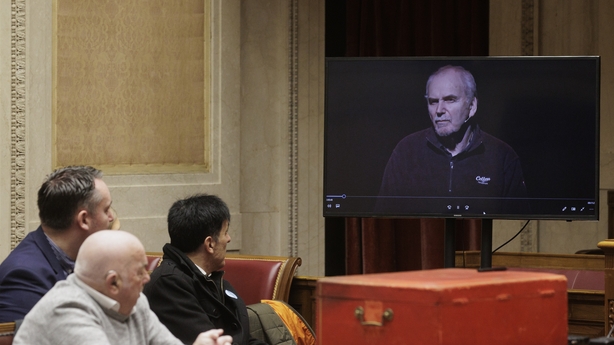A former police officer severely injured in a dissident republican bomb attack has said he would not join the Police Service of Northern Ireland (PSNI) if given the chance again.
Peadar Heffron expressed concern that policing is "broken" in Northern Ireland and said communities on all sides needed to do more to make it work.
He suggested politicians also had to "pull their finger out" as he reflected on the continued reluctance of some young nationalists to join the PSNI amid the security threat posed by dissidents.
Mr Heffron lost a leg when a dissident bomb detonated under his car near Randalstown in Co Antrim in 2010 as he travelled to work. He now uses a wheelchair.
As captain of the PSNI GAA team, the high-profile Catholic officer was targeted as part of efforts by dissidents to intimidate other nationalists from joining.
Mr Heffron, who is medically retired from the PSNI, was at Stormont today to address an event commemorating the European Remembrance Day for Victims of Terrorism.
Speaking to reporters afterwards, Mr Heffron, who now plays wheelchair hurling and basketball, insisted he held no bitterness in relation to what happened to him.
He has previously spoken about how he felt he had to leave his local GAA team in Randalstown when he joined the police due to the hostile reaction from some club members.

The former officer said he would like to some day build bridges with his former club, but he made clear he did not have any "ill feelings" towards the GAA, insisting the association was "in my blood".
Asked if he thought the GAA could do more to support and encourage its members to join the PSNI, Mr Heffron said he did not think it was the GAA's responsibility to help recruit people into the police.
However, he said there was a need for communities to improve outreach with the police so more people would be encouraged to join.
"I would say that some communities on all sides maybe need to look at themselves a bit to try to make policing work here, it's a bit broken at the minute I think," Mr Heffron said.
Asked about the ongoing reluctance of some within the nationalist community to become PSNI officers, he said: "I think if I was my 26-year-old self now, knowing what I know now, would I join the police? I wouldn't. My answer is no, I wouldn't.
"I think it comes back to communities, it's not within the police's grasp to change enough. I think it's people within the communities have to move a bit if they're going to have a police force that can work better."
Asked if there was a role for politicians in addressing the issues he raised, Mr Heffron said: "People up here (Stormont) could maybe pull their finger out."
Victims of NI terrorism brought together
The event brought together victims of terrorism from across society in Northern Ireland.
The annual European Day of Remembrance for Victims of Terrorism event was established to commemorate the Madrid bombings on the March 11 2004.
Peter Heathwood could not be there in person but shared his story by video.
He was seriously injured when loyalist gunmen shot him in front of his wife and three young children in north Belfast in 1979.
While he survived, the shock was too much for his father when he arrived to see his son being taken to hospital.
"The ambulence men hadn't been able to get the trolley into the back room so they put me in a body bag to carry me to the door," he recalled.
"Daddy saw me in the body bag and dropped dead of a heart attack."

Mr Heathwood spent 50 weeks in hospital for injuries that doctors said he was incredibly lucky to survive, and which left him having to use a wheelchair for the rest of his life.
For the first few weeks his wife was told not to tell him that his father had died.
"Eventually I was told and to this day it breaks my heart that such an honourable man died in the street."
He spoke of the "ripple" effect of the attack, which resulted in his wife Anne suffering from PTSD and alcoholism because she blamed herself for opening the door of their home when the gunmen rang the bell.
She died in 2006.
"Losing Anne was worse than losing the use of my legs, I just couldn't believe it," Mr Heathwood said.
My mum witnessed the terrible inferno and could visibly see her father at a top floor window trapped and unable to escape.
Michael Bingham spoke of the horror of watching as his grandparents Willie and Beth Herron and his aunt Noeline Herron were burned to death after the IRA firebombed their shop in Dromore in Co Down in April 1976.
An incendiary device planted in the shop on the groundfloor created an inferno that engulfed the entire building, including the top floor above where the family lived.
His mother ran to the scene after police had told her about the attack.
"My mum witnessed the terrible inferno and could visibly see her father at a top floor window trapped and unable to escape," he said.
"Sadly this was the last visible memory my mum had of her father, her mother, and her sister."
Three IRA members, two sisters and a man, were later convicted for planting the incendiary bomb.
But the two women, who had each been sentenced to 36 years in prison, were released after serving less than five years under the terms of the Royal Prerogative of Mercy.
The family was not consulted or informed about their early release.
Organisers of the event say it is vital that victims of terrorism have a voice.







